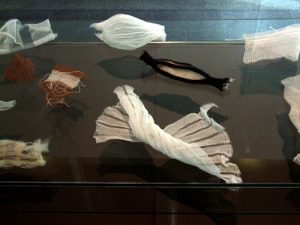Toni Hicks, knitter
While Toni Hicks taught at the University of Brighton, she was a freeman of the City of London and a liveryman of the Worshipful Company of Framework Knitters. She has worked with designers and researchers to develop the influence of knitted textiles in a number of areas, including design for well-being, textiles as an architectural material and ethical, sustainable practices in global textile traditions.
She graduated from the Woven Textiles course at Winchester and directly joined J.Henry Smith Ltd, a yarn supplier in Calverton, Nottingham, the village where the first knitting frame was invented, to establish a subsidiary company designing knitwear collections for retailers in the UK, including Browns, Selfridges, Liberty & Co. and Macys in NY. From the mid 1970s she worked as a designer on many collaborative projects, alongside a parallel career in Higher Education.
 During a span of more than twenty years Hicks collaborated with several fashion designers and companies to contribute the knit element to their collections. These include Hardy Aimes, Elaine Chaloner, Jasper Conran, Alan Couldridge, Tim Gardner, Deryck Healey, Benny Ong, Laura Ashley and Marks and Spencer Ltd. She also produced knitted textile designs and knit patterns for Courtelle to promote the yarns from their spinners, including, Thomas Burnley, Tilsa, Mossley Wool Combing and Spinning Ltd. and Benson Turner. She designed and calculated patterns for Lyric Pattern services and Hayfield wools and sold designs to DKNY and David Tan, Singapore. Additional projects have utilised her knowledge of weave and include designing upholstery fabrics for British Rail, furnishing textiles for stands at the Ideal Home exhibition, woven fabrics for Munrospun, Cavendish Textiles and Courtaulds.
During a span of more than twenty years Hicks collaborated with several fashion designers and companies to contribute the knit element to their collections. These include Hardy Aimes, Elaine Chaloner, Jasper Conran, Alan Couldridge, Tim Gardner, Deryck Healey, Benny Ong, Laura Ashley and Marks and Spencer Ltd. She also produced knitted textile designs and knit patterns for Courtelle to promote the yarns from their spinners, including, Thomas Burnley, Tilsa, Mossley Wool Combing and Spinning Ltd. and Benson Turner. She designed and calculated patterns for Lyric Pattern services and Hayfield wools and sold designs to DKNY and David Tan, Singapore. Additional projects have utilised her knowledge of weave and include designing upholstery fabrics for British Rail, furnishing textiles for stands at the Ideal Home exhibition, woven fabrics for Munrospun, Cavendish Textiles and Courtaulds.
After relocating to London in the mid 1970s and observing that knitwear design was not a recognised subject on most fashion and textile courses, Hicks introduced knit design to the University of Westminster (previously Harrow School of Art ) and worked in Ravensbourne College of Design and Communication, Winchester School of Art and the University of Brighton to deliver knit design projects to textile students. She also worked with students on the MA Fashion Womenswear and Menswear courses and the MA Constructed Textiles course at The Royal College of Art. From 1998, as Area Leader of the Knitted Textiles course at the University of Brighton, Toni has developed industrial links and maintained its international reputation as the most highly regarded course in its field.
From 2003 Toni has become increasingly involved in issues relating to the ethical and ecological factors governing aspects of the fashion and textile industries. She was a member of the steering group for Fashioning an Ethical Industry, a project to embed an awareness of such concerns into young designers. Her concern with the diverse issues associated with the subject led to interests in, for example, the relationship between sheep and the South Downs and the documentation on film of historical and manual textile skills practiced within a particular cultural or geographical location, to perpetuate knowledge of these traditions and techniques. Hicks also worked on Trading for Development projects which helped with the design and communication links between knitwear producers in communities in the alpaca producing areas of South America and retailers such as La Redoute and Topshop.
